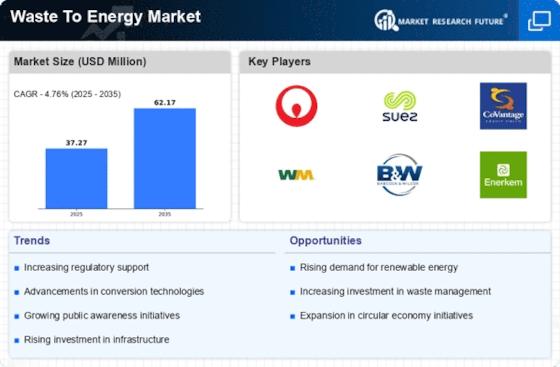Top Industry Leaders in the Waste to Energy Market

*Disclaimer: List of key companies in no particular order
In this dynamic landscape, both established players and innovative newcomers are vigorously competing for a substantial share of the expanding market. This article explores the key strategies adopted by industry leaders, essential factors influencing market share analysis, emerging trends, and the overall competitive scenario.
Key Player Strategies:
Prominent players in the Waste-to-Energy market, including-
Veolia
Huawei Enterprise
China Everbright Limited
Wheelabrator Technologies Inc.
SUEZ
Covanta
EDF
Ramboll Group
AVR
Allseas
are employing diverse strategies to gain a competitive edge.
Technology & Innovation: Leading companies such as Covanta, SUEZ, and Babcock & Wilcox are heavily investing in advancing WtE technologies. This includes breakthroughs in gasification, plasma pyrolysis, and high-efficiency incineration systems, all aimed at minimizing emissions, maximizing energy output, and efficiently processing diverse waste streams.
Geographic Expansion: Established players are expanding globally, targeting high-growth regions like Asia-Pacific and Eastern Europe. Smaller players focus on niche markets or specific technologies to establish distinct positions in the market.
Diversification & Integration: Companies are diversifying beyond WtE plants, offering waste management services, consulting, engineering expertise, and exploring synergies with renewable energy sectors like biogas generation. Integration across the waste value chain enhances competitiveness and customer acquisition.
Sustainability & Circular Economy: Environmental consciousness is a key driver of WtE strategies. Companies emphasize cleaner operations, reduction of air and water pollution, and minimizing waste-to-landfill. Some are exploring ways to recover valuable materials from waste streams, aligning with circular economy principles and creating a more sustainable business model.
Market Share Analysis:
Several critical factors influence market share analysis in the Waste-to-Energy sector:
Technology Employed: Companies with expertise in advanced technologies, such as gasification, often hold a competitive advantage, especially in regions with stringent environmental regulations.
Project Track Record: A proven track record of successful WtE project implementation, meeting regulatory compliance and operational targets, instills confidence in investors and potential clients.
Geographical Presence: Companies with a wide geographical reach and established networks in high-growth regions gain a distinct advantage in terms of market access and project opportunities.
Financial Strength & Partnerships: Strong financial backing and strategic partnerships with waste management companies, investors, and government entities provide players with the resources and leverage needed to secure large-scale projects and gain market share.
Emerging Trends & New Players:
Decentralized WtE Solutions: Smaller, modular WtE units are gaining traction for their ability to handle waste locally and reduce transportation costs. Startups and smaller players are innovating in this space, offering solutions suitable for remote communities or specific waste streams.
Digitalization & Automation: WtE operations are embracing automation and digital technologies to enhance efficiency, optimize resource utilization, and achieve real-time performance monitoring. This opens doors for collaborations with data analytics companies and technology providers.
Focus on Renewable Energy Integration: WtE facilities are increasingly exploring synergy with renewable energy sources, such as biogas production from waste-derived methane, allowing for further diversification of energy output.
Overall Competitive Scenario:
The Waste-to-Energy market is marked by intense competition, with established players leveraging their experience and scale, while startups and nimble companies disrupt the landscape with innovative technologies and niche solutions. Collaboration and partnerships are crucial for success, as companies recognize the need to combine expertise and resources to tackle complex waste management challenges and navigate evolving regulatory landscapes. Sustainability and environmental consciousness shape the competitive landscape, urging players to adopt cleaner technologies and demonstrate circular economy principles. Ultimately, companies offering efficient, cost-effective, and environmentally responsible WtE solutions are poised to stand out and thrive in this dynamic and lucrative market.
Industry Developments and Latest Updates:
China Everbright Limited: On July 11, 2023, successfully started operations of its new WtE plant in Jiangsu province. (Source: China Everbright website)
Wheelabrator Technologies Inc.: On August 3, 2023, signed a long-term agreement with Eversource to supply renewable energy from its Bridgeport WtE facility. (Source: Wheelabrator website)
SUEZ: On March 31, 2022, completed the merger with Veolia, creating a global leader in ecological transformation. (Source: SUEZ website)
Covanta: On July 19, 2023, partnered with Microsoft to implement their Azure cloud platform for data management and analysis at its WtE facilities. (Source: Covanta website)

